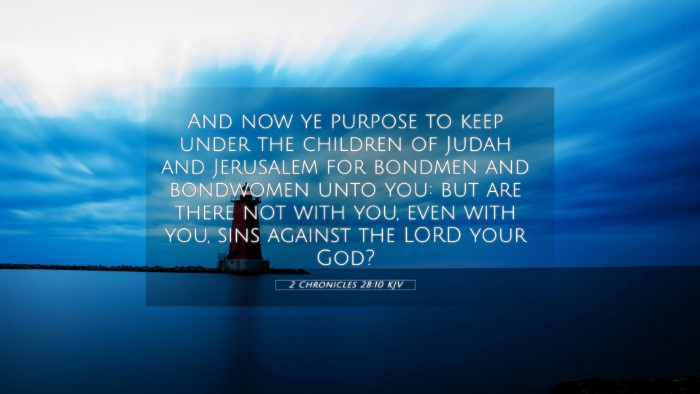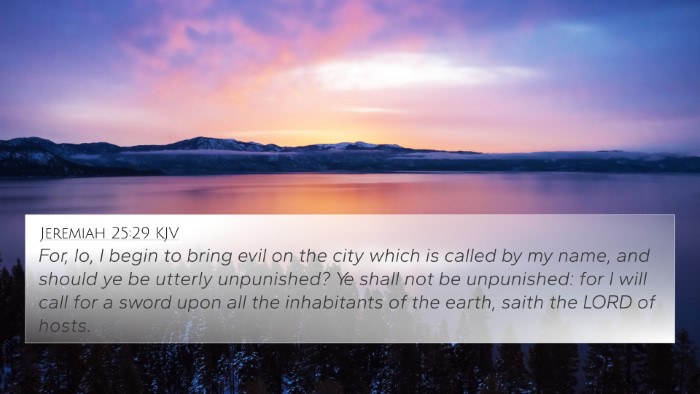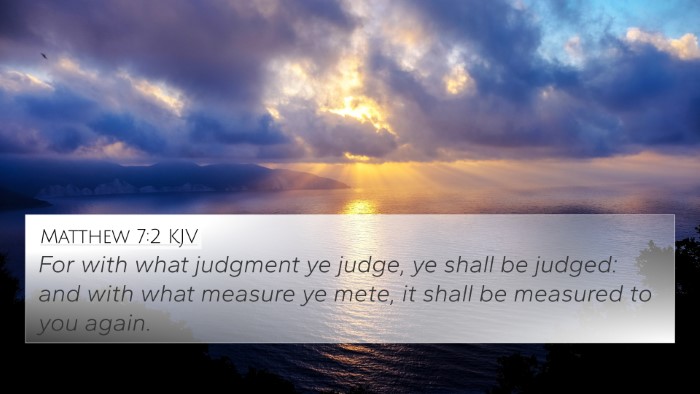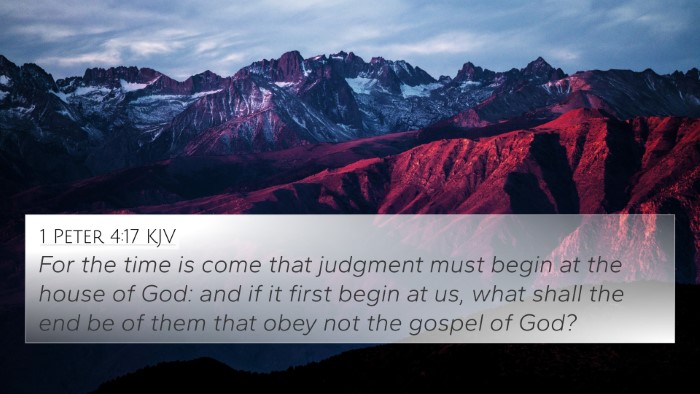Understanding 2 Chronicles 28:10
Bible Verse: 2 Chronicles 28:10
This verse reads: "And now you intend to force the children of Judah and Jerusalem to be your bondmen and bondwomen: but are there not with you, even with you, sins against the LORD your God?"
Meaning and Interpretation
The context of 2 Chronicles 28:10 unfolds during a tumultuous time in Judah's history, specifically during the reign of King Ahaz. Several commentaries shed light on the implications of this verse, addressing the actions taken by the Israelite leaders against Judah.
Commentary Insights
Matthew Henry's Commentary
Henry emphasizes the moral implications of attempting to enslave one’s kin, especially in the face of one's own sins. He points out that forcing others into servitude is a severe injustice and warns of the dire consequences sinners face. He contextualizes Judah’s dire situation as a call for repentance, suggesting that those who sin should first examine their own hearts before inflicting harm on others.
Albert Barnes' Notes
Barnes stresses the idea that the leaders of Israel, who desired to enslave their brethren—the people of Judah—were blinded by their shortcomings. He highlights the irony and hypocrisy in their intent to judge others without recognizing their own sins against God, suggesting that awareness of one's failings is essential before passing judgment on others.
Adam Clarke's Commentary
Clarke discusses the consequences of Israel's willful actions, noting that their aggression was not only an act against Judah but also against God. He implies that the historical context places Israel’s divine favor at risk due to their illicit plans, which ultimately reflect a larger pattern of disobedience against God’s law.
Biblical Connections and Cross-References
This verse resonates with various other biblical texts, forming a framework for understanding the themes of sin, judgment, and mercy throughout scripture. Below are some relevant cross-references:
- Ezekiel 18:12 - A reminder that each individual is responsible for their own sins, reinforcing the theme of accountability.
- Matthew 7:1-2 - Jesus' teaching on judgment emphasizes the importance of examining our own faults before judging others.
- Galatians 6:7 - A powerful notion that we reap what we sow; it ties into the idea of retributive justice in spiritual matters.
- Isaiah 10:1-2 - This passage warns about oppressive laws and injustices, aligning with the themes in 2 Chronicles.
- Romans 2:1 - An exhortation against hypocrisy, highlighting that judging others while committing the same sins is a form of self-deception.
- Proverbs 24:11 - This verse stresses the moral duty to rescue those unjustly treated, supportive of the plea against exploitation in Chronicles.
- Psalm 106:36-37 - A historical reflection on Israel’s failures, providing context to the ongoing cycle of sin discussed in Chronicles.
- James 2:13 - The law of mercy over judgment, suggesting that compassion prevails in the face of condemnation.
- 1 John 1:8 - A reminder about the nature of sin and the importance of recognizing it, aligning closely with the call for self-examination in 2 Chronicles.
- Micah 6:8 - This verse encapsulates the moral obligations of believers, calling for justice, mercy, and humility before God.
Thematic Analysis
The themes in 2 Chronicles 28:10 encapsulate overarching narratives found throughout the Old and New Testaments, reflecting on human nature, moral failings, and our need for repentance. The intent to make others bondmen can be seen as an allegory for spiritual bondage, both physically and emotionally. This thematic discussion reveals inter-Biblical dialogues that stretch beyond the immediate context:
- Reliance on Divine Justice: The inhabitants of Judah were called to trust in God’s righteousness rather than succumb to fear.
- Hypocrisy and Accountability: The need for personal responsibility in the face of communal sin is a recurring Biblical theme.
- Call to Repentance: Throughout scripture, the call for repentance stands as a crucial message, urging God’s people to turn away from injustice.
- The Danger of Division: The fissures between Judah and Israel serve as a cautionary tale about the dangers of internal conflict among God's people.
Conclusion
2 Chronicles 28:10 serves as a pivotal reminder of the importance of introspection in spiritual matters. The verse admonishes against hypocrisy and urges believers to consider their own sins before passing judgment. Through a detailed analysis of this passage and its connections to broader biblical themes, Christians are encouraged to approach the Scriptures with a heart open to correction and a yearning for justice, mercy, and understanding.
Utilizing tools for Bible cross-referencing can greatly enhance one’s comprehension of these interconnected verses. Engaging in comparative Bible verse analysis helps in uncovering God’s intentions and the lessons He seeks to impart through His Word.







